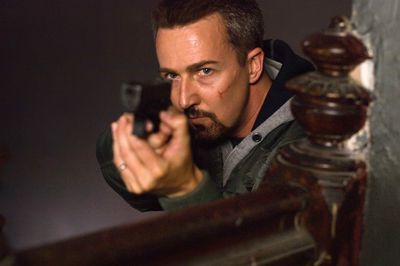Sensation over sense
’Pride and Glory’ goes too far

The Tierneys have given a lot to New York.
A father, who slowly rose up the uniformed ranks of the police. Two sons – and a daughter’s handsome husband – all of whom put on the blue and the badge, too, and still go out every morning to keep the peace.
A man couldn’t be prouder of a family like that. Too bad only one of them has reason to be proud of himself.
“Pride and Glory” wants to be one of those big, sprawling, ethnic crime stories about family and loyalty and duty. And it is, mostly – until a bad, third-act detour when it turns into a cops-and-slobbers melodrama, full of shouts and crying jags and the corniest fistfight since “The Quiet Man.”
Jon Voight – in a performance that’s a little sad, only because it reminds you of how great he can be, given the chance – is the grand and slightly pickled patriarch; Noah Emmerich and Edward Norton are his sons (never mind that they look nothing alike). And Colin Farrell, doing another of his frantic violent boyos – time to give that cliché a rest, lad – is the outsider who married the family beauty.
Emotionally, Emmerich is the underestimated son, Norton the tortured but brilliant moralist, Voight the protect-your-own papa and Farrell the unpredictable hothead. And once you see that’s the mix – and a murky mystery about dirty cops and a suspicious shootout is introduced – you know how the whole thing’s going to turn out.
The problem is, that takes two hours. And not all of that time is spent profitably.
There are a few nasty touches (including the most strung-out junkies since “Fort Apache, the Bronx”) and bizarre details (in a pinch, it seems, a raw potato makes a handy silencer). And the performances are mostly brilliant – Norton has several good scenes with Voight, as they go toe-to-toe and work their way through all sorts of father-and-son conflicts.
But the script, by director Gavin O’Connor (and brutalist Joe Carnahan, who also wrote “Narc” and “Smokin’ Aces”), is far more interested in violence than in the intricacies of police work or politics. And O’Connor doesn’t know where to put the camera, except as close to the blood and gore as possible. (In a film filled with shootouts and chases, there isn’t a single stand-out action sequence.)
He also overstuffs the movie with more moods than an Irish wake. One character has a broken marriage; another has a wife dying of cancer; a third is pretty much a stumbling alcoholic. None of this is really developed; it just decorates the film like mourning ribbons, an outward sign of the filmmakers’ seriously morose intentions.
It’s bearable for two acts, but eventually sensation overtakes sense. Perhaps the clearest evidence comes in a climactic scene in which the best cop and the worst cop confront each other. The good cop has the drop on the villain; all he needs to do is make him put his hands out, cuff him and march him down to the station. But does he do that?
No, instead he makes the criminal put his badge and gun on the table. Then he puts his own badge and gun on the table. And then, fists cocked like a couple of John L. Sullivans, they engage in a manly bout of fisticuffs, while Irish songs blare. Tis the only way men like themselves could settle such a thing, don’t you see, now?
For times and locations, see page 6.